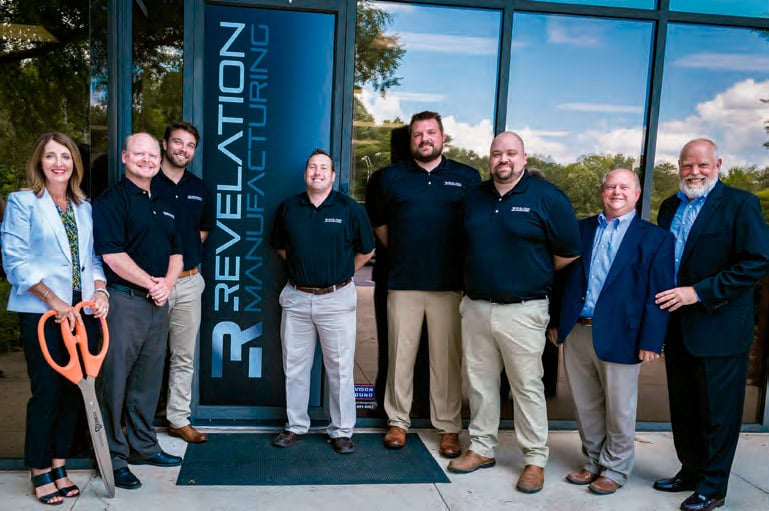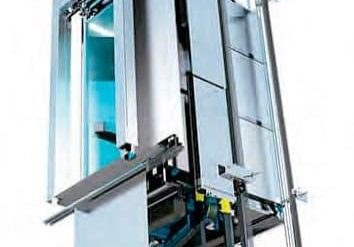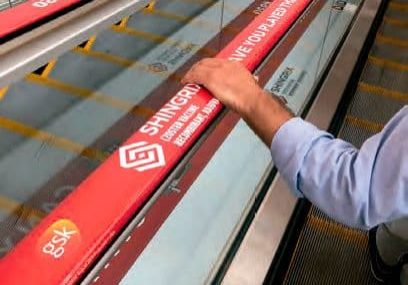Genesis Begets Revelation
May 1, 2020

Home elevator manufacturer “building a better mousetrap” at new Atlanta facility.
by Kaija Wilkinson
Custom and standard home elevators began rolling off the line at Revelation Manufacturing in Atlanta in March 2019, with nearly 50 employees of Genesis Elevator Co. Inc. — from which Revelation was born — gathering for a ribbon-cutting ceremony at the new, 15,000-ft2 facility. Revelation is led by President Jay Arntzen (also president of Genesis), Production Manager Miles Maddox, Genesis Vice President of Service Ryan Covert, and board members Al Seeba (chairman), Rich Allen, Steve Yenser and Scott Hutter. Owners are Jay Arntzen and his wife, Tracy; Bo Collins; Stewart Smith; Michael Tilley; and Seeba. Revelation has only four Atlanta-based employees, due, in large part, Jay Arntzen says, to its focus on Lean, automated, ergonomic manufacturing processes that aim to deliver easier-to-install, high-tech elevators. “We aim to have something that’s a better mousetrap,” Arntzen says, adding that Seeba’s manufacturing expertise, learned when he was president of John Deere-Hitachi, is proving invaluable.
Revelation produces five to seven elevators per year, compared with Genesis, which installs roughly 150 elevators per year from its facility in Kennesaw, Georgia, just north of Atlanta. Jay Arntzen says:
“Genesis is a known quantity in the Atlanta market. We have a base of customers there that do recurring business with the company. Revelation has a relationship with Genesis that enables it to deliver products to customers faster and more efficiently. We’re licensed to do business in Alabama, the Carolinas, Florida and Georgia, and are evaluating distributors in other markets.”
Four years after it was founded, Genesis told ELEVATOR WORLD (EW, October 2012) about its plan to focus on the commercial market in light of the subprime mortgage collapse and recession putting a damper on the residential elevator market. Does the launch of Revelation point to the resurgence of residential? Yes, Jay Arntzen says, but the company is also putting systems and processes in place that will allow it to grow and scale back as market conditions dictate. “Although we’re small now, the focus is, ‘What does a big company look like?,’ and we aim to make that a reality as quickly as possible.”
Covert said Revelation’s process-driven approach and use of automation allow it to quickly adjust to varying demands by applying 5S principles. 5S is a Lean manufacturing methodology involving five steps: sort, set in order, shine, standardize and sustain. According to Oregon-based Lean manufacturing retailer Creative Safety Supply, “These steps involve going through everything in a space, deciding what’s necessary and what isn’t, putting things in order, cleaning and setting up procedures for performing these tasks on a regular basis.”[1]
Although we’re small now, the focus is, ‘What does a big company look like?’ and we aim to make that a reality as quickly as possible.
— Revelation owner
Jay Arntzen
Revelation’s connection to Genesis, which is getting the word out about Revelation, is already generating business. In August 2019, the Revelation team shared that it had landed a multiunit contract with Atlanta-based Brock Built LLC, which builds townhomes. Jay Arntzen says:
“We’re generating very good interest and feedback in that we have one of the largest menus of home elevators in Georgia. Genesis is a leader in the markets we serve for home elevators, but it’s not even close to the size of our commercial business. That’s really why we set this [Revelation] up as a separate company, so we can focus on delivering great products like Genesis to our customers.”
Revelation produces two products. “One is for custom homes that can meet any requirements the homeowner desires,” Covert says. “The other is a standard model built specifically for larger builders.”
The Revelation team is optimistic about the residential elevator market over the next five years. The assumption that home elevators are strictly for disabled individuals, Covert says, is mistaken. The owners of single-family homes look at elevators “more like an appliance than a luxury item, and we think that trend is going to continue.”
Another key difference between now and seven years ago is increased urbanization in city centers. “It is safe to say the market has definitely come back,” Covert says, “but the reality is, there will be another major downturn, and we need to understand that and plan for it.” Revelation has structured the business to be able to weather whatever economic storms are potentially brewing by creating a robust service division. “Customers like our no-nonsense approach and how we put them first in the process,” says Brittney Seager, home elevator sales representative for Genesis.
The principals also say they are aware of the concerns some home elevator designs are potentially dangerous for children. They observe Georgia has “one of the more stringent codes relating to home elevators,” with which Revelation complies. Through brainstorming sessions, the company is looking at other ways to innovate its products to make them even safer. Jay Arntzen states:
“Safety is paramount. It is really the first thing we look at — making sure the components we provide and install are of the highest quality. We can’t control what a customer does after we deliver the product, but we can make sure we educate them and do our part to help keep passengers safe.”
As one may guess from the names, both Genesis and Revelation are faith-based. When your author spoke with Revelation, 15 Genesis/Revelation employees were preparing to leave for Cambodia to perform work on behalf of Saving Susan Ministries, a nonprofit founded by Jay and Tracy Arntzen focused on helping orphans and widows in third-world countries.[2]
Smith, Genesis vice president of commercial installation, says both Genesis and Revelation “really do walk the talk” in terms of giving back. Nineteen percent of all profit goes toward nonprofit ministries. Smith says:
“It’s something we share both internally and with our customer base. It’s really where our passion is. We don’t go out and promote it to get elevator business. We use the elevator business as a way for us to do more for what we believe to be our true cause, which is to serve in the orphan-care area and change the trajectory of these children’s and women’s lives.”
References
[1] creativesafetysupply.com
[2] savingsusanministry.org
Get more of Elevator World. Sign up for our free e-newsletter.









